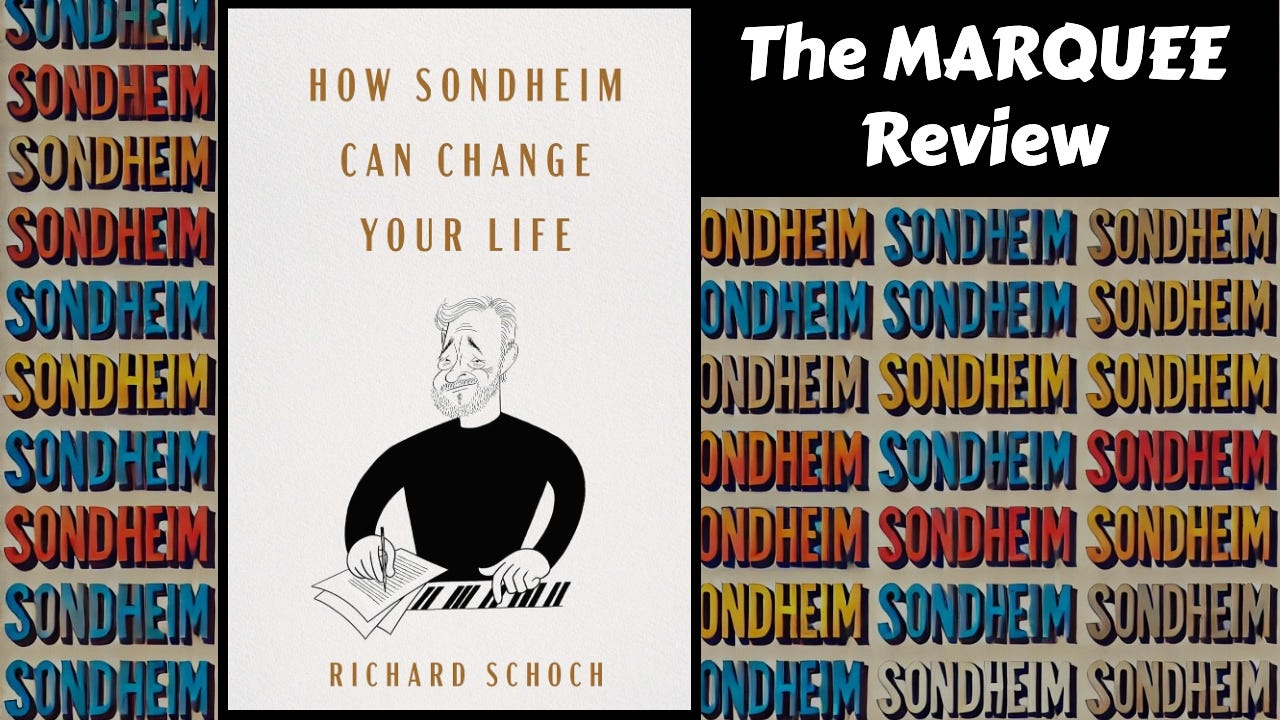Has Sondheim Changed Your Life? New Book Shows How "The Way is Clear"
Richard Schoch's tribute to The Master's legacy hits stores later this month
Shalom, Broadway lovers!
In today’s MARQUEE: The Broadway Maven’s Weekly Blast: A) a review of a great new book about how Sondheim can change people’s lives; B) a quick video tour of Jewish Broadway; C) a Broadway Blast about Les Misérables and Beauty and the Beast; D) a Maven Scholar review of the current Israeli production of Waitress; E) an unusually creative and punny quiz about the names of shows that have won Best Musical; and F) a Last Blast about Company.
ANNOUNCEMENT: MARQUEE is now a FREE publication, with the full version available to everyone. And the ALL-ACCESS Pass program is being phased out, with current Passes expiring December 31. Anyone else who'd like to attend all the Broadway Maven classes (such as the upcoming “Lyricist Lessons” and A Chorus Line) can become a Member for just $18 a month, which provides access to 5-15 classes and expert-let Broadway experiences. It includes a password to the Clips Archive and periodic giveaways to Broadway and off-Broadway shows, including at least one opening night performance and party. Join this vibrant learning community at the button below, and through December 31 only we’re offering non-Members one month’s FREE membership (cancel at any time).
REVIEW: Anyone who has been moved to tears by stage portrayals of a demon barber, a 35-year-old bachelor, or Lee Harvey Oswald has felt the knack of Stephen Sondheim (with his collaborators) at reaching through the curtain to touch our souls. But how does he do that? And how, as we gain more exposure to his work, can we speed the process along?
How Sondheim Can Change Your Life (which comes out Nov. 19) is a 238-page exploration of that very topic. Written by Shakespeare expert Richard Schoch, the tone is conversational but filled with enough thoughtful, often-witty references to lyrics from Sondheim's decades of creative output that it's a book to be savored rather than skimmed.
Each chapter discusses a different show (a dozen in all), focusing on an intriguing life lesson, like "How to Be Who You Are" for Gypsy and "How to Let the Darkness In" for Assassins.
My favorite chapter is about A Little Night Music, and it focuses on lessons learned from Sondheim's signature "Send in the Clowns," exploring "how to handle your regrets." It's a very close look at a very inspired number, and it's followed by a contrast: the way Petra in the same show handles her own regrets in “The Miller’s Son,” with a passionate engagement with life. The parallel analysis helped me look at the whole show in a new way.
And the chapter on Sweeney Todd is inspired as well, looking at the show's themes of injustice and revenge. This excerpt should give you a taste of the book's respectful but pedagogical approach to incorporating Sondheim into our own Weltanschauungs:
What, the show asks, is our response to injustice? Not the trivial wrongdoings that give rise to our petty grievances, but the entrenched suffering that does seem to be the way of the world, its dark and fixed course. This is what Sweeney Todd pushes us to confront. Not in a didactic way, and not -- for Sondheim loathed all preaching -- with ready-made answers. It is enough for theater to state the question -- especially when it's a question we'd rather not hear -- and to respect its audience by letting them answer it for themselves. Answer it with the conduct of their lives.
There are a few glaring omissions, including an unfortunate tendency to bracket out the contributions of Sondheim's genius book writers (Hugh Wheeler barely gets three mentions). It's just not right to quote the librettos extensively (which he does) while glossing over Sondheim's well-known insistence that he was not the sole author of his musicals.
He also leaves out West Side Story and the easily but unfairly dismissed A Funny Thing Happened on the Way to the Forum. Schoch excuses these gaps by claiming those shows don't offer mature life lessons like the others, pointing to Sondheim's own downplaying of the quality (!) of those shows' lyrics. I mean, the latter musical declares from its fifth word that it has "something for everyone." It does.
But so does How Sondheim Can Change Your Life.
VIDEO: Here’s a two-minute tour of the Jewish presence in Broadway shows, from Guys and Dolls to Ragtime to The Producers.
BROADWAY BLAST: In both Les Misérables and Beauty and the Beast, two of Broadway’s longest-running and most beloved shows, candlesticks symbolize second chances and redemption through the kindness of others. The Bishop’s gift of candlesticks in Les Misérables offers Jean Valjean more than a physical escape—it grants him spiritual salvation, igniting a profound transformation that leads him to dedicate his life to helping others. In Beauty and the Beast, Lumière’s light serves as both a literal and figurative beacon of hope, his playful charm and unwavering optimism helping the entire castle staff—and ultimately the Beast—believe in love’s power to break even the most hopeless curse. Both candlesticks—one a symbol of divine grace, the other of magical warmth—demonstrate that light, whether spiritual or enchanted, not only guides individuals toward redemption but also inspires those around them to transcend their pasts and embrace a future shaped by love, kindness, and the power of human (or enchanted) connection.

STUDENT REVIEW: The Israeli production of Waitress (Meltzarit) offers a beautifully executed rendition of Sara Bareilles’ hit musical, featuring a cast that brings Bareilles' moving score to life. Meshi Kleinshtein shines in the lead role of Jenna, with a voice so captivating that it alone could carry the show. She’s perfectly complemented by the women playing Becky and Dawn, creating the iconic, quirky trio that keeps audiences entertained. The production, still running strong over a year after its Tel Aviv debut, clearly does justice to the original show.
However, the theater etiquette left something to be desired. Lucky enough to sit in the front row, I was frequently distracted by fellow audience members checking their phones. Some had the nerve to do so during “She Used to Be Mine”—Jenna’s heart-wrenching solo. It's frustrating, and this lack of courtesy just pulls focus from the performers’ literal sweat and tears they leave out on the stage with each performance.
I’d highly recommend seeing a show in Tel Aviv if you have the chance. And if so, turn off your phones and just soak in the magical air of live theater for a couple hours. -Dan Berlfein, Broadway Maven Scholar Fall 2024
QUIZ: Do you know your Tony Best Musical winners? If so, this quiz should be a breeze. Each question lists two years—just add the titles of the winning musicals from those years to solve the clue. Here’s an example:
Clue: What to do when the show owes you money? 2000 + 2001
Answer: Contact The Producers
Got it? Now try these:
1. Sun-Maid, for example? 1974 + 1971
2. A possible mailing address in New York? 1969 + 1981
3. How to afford living uptown? 1996 + 2008
4. What many pet owners are doin'? 1974 +1983
5. A nickname a certain orphan might resent? 1959 + 1977
6. What a nightclub singer loves to hear? 1967 + 1970
7. Greetings you might make as people come and go? 1964 + 1961
8. Rush and AC/DC pay a call on a movie monster? 2018 + 1988
9. Enthusiasm for Ultra-Clutch? 2003 + 1994
10. A guide for lazy but enterprising potential employees? 1962 + 2012
The answers are at the end of the issue, below the Last Blast. Do you have a clever clue of your own? Share it in the comments!
Join us for a deep dive into the revolutionary music of Hamilton with music educator and Broadway Maven co-host Mateo Chavez Lewis leading the class from his piano. Whether you’re a longtime fan of the musical or new to the world of Broadway, this three-part course will break down the brilliance behind Lin-Manuel Miranda’s iconic show in ways that are both fresh and deep.
The FREE class meets three Sundays in November (the 10th, 17th, and 24th) at Noon and 7 pm ET.
Note: A full calendar of upcoming classes is always available at TheBroadwayMaven.com.
• Sunday, November 10 Noon and 7 pm ET “Broadway, Rap, and Broadway Rap” — The music of Hamilton (FREE, register here)
• Tuesday, November 12 Noon ET Lyricist Lessons part one (Members only)
• Thursday, November 14 5:30 pm ET Ed Barnes class on Irving Berlin’s “This is the Army” — 20 percent off for non-Members who use the code MAVEN20; FREE for ALL-ACCESS and Members (you’ll receive your own code via E-mail).
• Sunday, November 17 Noon and 7 pm ET The music of Hamilton Act One (FREE, register here)
• Tuesday, November 19 Noon ET Lyricist Lessons part two (Members only)
• Wednesday, November 20 Noon ET Guest speaker Louis Hobson, who played Dr. Fine and Dr. Madden in the original Broadway production of Next to Normal (Members only)
• Sunday, November 24 Noon and 7 pm ET The music of Hamilton Act Two (FREE, register here)
• Monday, November 25 Noon ET “Transition: Broadway's surprising history between Oklahoma! and Carousel“ with Broadway Nation host Prof. David Armstrong (Members only)
• Tuesday, November 26 Noon to 2:30 pm ET SondheimFest part one (FREE, Registration opens soon)
• Tuesday, November 26 7 to 9:30 pm ET SondheimFest part two (FREE, Registration opens soon)
• Monday, December 2 Noon and 7 pm ET A Chorus Line part one (FREE, Registration opens soon)
• Tuesdays December 3, 10, and 17 Sondheim: Bit by Bit (Members only)
• Monday, December 9 Noon ET A Chorus Line part two (Members only)
NOTE: As always, Broadway Maven Members and ALL-ACCESS Passholders (through December 31) do not have to sign up or pay for anything. Just show up!
LAST BLAST: "The Ladies Who Lunch" from Stephen Sondheim's Company is often considered something of an enigma, given the song's penultimate place in the show's second act, which is usually reserved for an "eleven o'clock number" showing some kind of character growth or self-realization. Instead, it would seem, we have a more peripheral character, Joanne, singing about a type of woman who, while perhaps like herself, is not all that present in central character Bobby's 35-year-old life. But perhaps the song is more about Bobby than we think. She starts the song with "Everybody laugh" and ends with "Everybody rise," thus laying down a challenge to Bobby, who has spent much of his life laughing along without really engaging. Joanne’s words become a dare—she’s tired of watching him coast through relationships with a shrug and a joke. By saying “rise,” she’s urging him to, well, get off of his rump and shed his role as the perpetual onlooker She calls on him to finally take decisive action, inviting him to rise above the safety of laughter and embrace life’s full intensity. Which Bobby most decidedly does in the final number, "Being Alive," in which he finally -- and famously -- expresses his ultimate wish for connection with another human being. Joanne's song helps us see, however unconsciously, how Bobby is going from laughing to rising.
ANSWERS TO QUIZ: 1. Raisin Company; 2. 1776 42nd St.; 3. Rent In the Heights; 4. Raisin Cats; 5. Redhead Annie; 6. Cabaret Applause; 7. Hello Dolly! Bye Bye Birdie; 8. The Band's Visit The Phantom of the Opera; 9. Hairspray Passion 10. How to succeed in business without really trying Once.
The Broadway Maven is a vibrant educational community that helps its members think more deeply about musical theater. Every month, members may attend 5-15 expert-led classes and innovative Broadway experiences, all for just $18. We also foster enthusiasm for Broadway through the FREE weekly substack newsletter MARQUEE and host an expansive YouTube channel. It's your home for Broadway appreciation. Contact The Broadway Maven at DavidBenkof@gmail.com.








